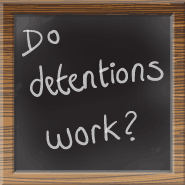Detentions. Often they can feel like they punish the staff more than they punish the student. When you ask interviewees why they wanted to become a teacher, it is unlikely that any of them replied that they looked forward to the chance of staying late after school to supervise the very students who had made their day miserable to begin with.
So why do schools carry on with them? Because they can, when used correctly, work.
Firstly, they have to be balanced out with a robust rewards system and that system has to include rewards for expected behaviour. Whilst this concept may still grate with many in education, it is clearly counter-productive to sanction negative behaviour without rewarding the positive. If the only time students gain the attention of staff is through negative behaviour, than that sanction essentially becomes a reward. So before you address your sanction, address your rewards. Make them as relevant as you can and then stick to them.
Once you have your rewards fixed, turn to your sanctions. Create a fair rota for your staff and make sure, certainly at the beginning of the detention period, that senior staff are available to send a clear message that these detentions are meaningful and enforced. Then make sure that meaningful and relevant work is available at every session. This will ensure that your detainees are forced to see themselves as making up the time they have wasted through their negative behaviour. Just as rewards need to be meaningful, so do sanctions.
So will this all work? Not at first. Students will avoid turning up, they will complain and moan but research suggests that detentions are perceived by students as being an effective sanction and an effective deterrent. But just as rewards only work is they are seen as relevant, so do sanctions. The commitment of staff to ensure compliance and provide work that is meaningful and relevant will be the determining factor into whether the detentions are actually effective. This presents a challenge for leadership in any school, as asking already overstretched staff to increase their workload might pose problems for staff wellbeing and morale. The presence of senior staff at detentions will not just support the students in feeling that their detentions have meaning, but will also show solidarity with the staff who are giving up their time.
But what’s the other side of this equation? Discipline can go too far, when an atmosphere conducive to learning instead becomes oppressive for many schools. What is crucial in determining how effective detentions are is to ensure that they are used in situations where learning was affected to ensure that the students get a sense of what they missed out on when they participate in the detentions. Make sure that there is a sense of transaction – a quid pro quo between the missed learning caused by the negative behaviour and the learning caught up on in detention.
Detentions don’t work when they are viewed as arbitrary or unconnected to the negative behaviour that triggered them. They do work when they are taken seriously, supported by engaged staff and a genuine attempt to make up for lost learning.









